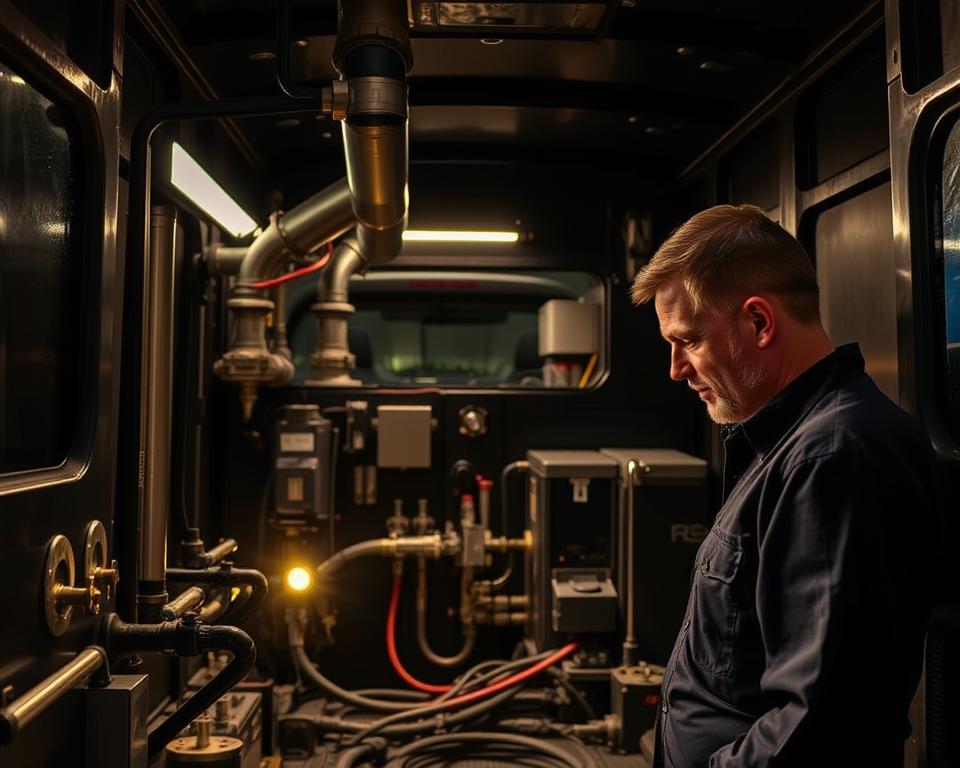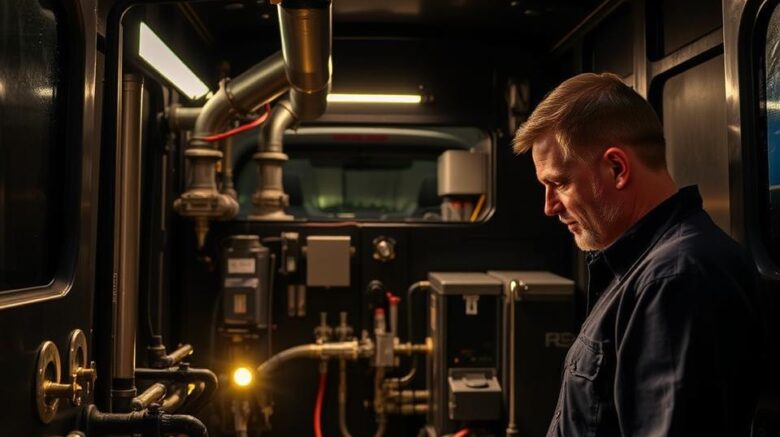Mobile Trailer Septic Tank Pumping: Must-Read Guide
Have you thought about the fall-out of disregarding your mobile unit’s septic system? For those owning RVs and mobile units, it’s imperative to recognize the importance of trailer septic Tank Pumping. It secures your road adventures are trouble-free and living conditions are kept sanitary on the road. By prioritizing regular grey water tank pump, this guide seeks to make you proactive in looking after your septic system, sidestepping potential headaches – notably when soaking up the great outdoors.
Within these pages, comprehensive guidance into choosing reliable mobile septic services is offered. Plus, you’ll see to detect when your septic Tank requires quick attention. Grasping the process for streamlined trailer septic Tank Pumping completes the picture. Rather than reacting to issues as they pop up, let this guide to supply you with necessary knowledge. This helps guarantee your RV experiences keep carefree!
The Necessity of Scheduled Trailer Septic Tank Pumping
Consistent upkeep of your RV’s septic Tank is paramount for its wastewater system’s performance. Ignoring this can lead to clogs and backups, ruining your vacation and damaging the environment. Sewage leaks from an full Tank can contaminate the area, presenting major problems.
Hiring professional Pumping services like All-In Sanitation is prudent for RV owners. This step stops issues and enhances your system’s functionality and longevity. On-schedule Pump-outs mean a safer, safer environment in RV parks and campgrounds.
Understanding Your RV’s Septic System
A camper septic system consists of three primary elements: the black water Tank, grey water Tank, and fresh water Tank. For RV owners, it’s critical to know these parts. They are central in waste management. The black water Tank captures toilet sewage, and the grey water Tank collects water from sinks and showers.
Each Tank has a distinct role in ensuring the trailer healthy and operational. Checking the levels in the black water and grey water Tanks is crucial. It helps avoid overflows, bad smells, and damage to the septic system.
To clarify, below is a table that highlights differences between the black water and grey water Tanks:
| Feature | Black Water Tank | Grey Water Tank |
|---|---|---|
| Purpose | Holds sewage waste | Collects wastewater from sinks and showers |
| Maintenance Frequency | Requires frequent Pumping | Needs occasional emptying |
| Potential Issues | Odors, blockages from solids | Risk of grease buildup |
| Typical Size | Generally bigger than grey water Tank | Smaller than black water Tank typically |
Grasping your RV’s septic system is fundamental for maintenance. It ensures smooth travel experiences. Watching both Tanks delivers trips with no septic concerns.

Clues Your Septic Tank Needs Pumping
It’s important to recognize when your septic Tank needs Pumping to preserve your system sound. Identifying issues early can sidestep major repairs and environmental harm. Key signs that call for attention include:
- Slow draining sinks, which may suggest a full Tank or clog.
- Gurgling toilets, hinting at blocked pipes or a failing septic system.
- Foul odors around your RV, an early warning of rising sewage.
- Pooling water near the drain field, revealing that your Tank may be overwhelmed.
- Sewage backups in your toilets or drains, a definite sign prompt action is needed.
Being mindful of these signs enables RV owners to act swiftly, avoiding grave issues. Monitoring your system and responding to these indicators can prolong your septic system’s lifespan. This approach delivers a smoother trailer experience.
Variables Impacting Pumping Frequency
A septic Tank’s capacity largely influences how often it calls for Pumping. Larger Tanks require less frequent service because they store more waste, in contrast smaller Tanks require closer-interval Pumping.
The rig count using the septic system also impacts Pumping frequency. With more RVs, the system experiences increased strain, necessitating quicker Pumping. Notably through peak seasons, tweaking the schedule is key to avoid problems.
Here is a table that presents recommended Pumping intervals based on typical scenarios:
| Septic Tank Size | Number of RVs | Recommended Pumping Frequency |
|---|---|---|
| 500 gallons | 1-2 RVs | About every 2-3 years |
| 1000 gallons | 2-4 RVs | Every 3-5 years |
| 1500 gallons | 4+ RVs | Approximately every 1-2 years |
Correctly setting your septic Tank’s Pumping frequency enhances its operation. It also lengthens its life and effectiveness. This selection is key for maintaining system health.
Finding a Dependable Septic Pumping Service
Finding a dependable septic Pumping service is vital for your RV’s septic system health. It ensures prompt and efficient Pumping, preventing pricey future repairs. When shopping for a septic service provider, focus on these key aspects:
- Experience: Find companies with a proven track record. Their hands-on know-how with various septic systems, especially those for RVs, is paramount.
- Customer Reviews: Check online reviews and testimonials. High feedback and strong ratings are indicators of a dependable provider.
- Response Time: Quick response times demonstrate a company’s focus to their customers and ability to meet their needs efficiently.
- Knowledge of Systems: Specialized knowledge of trailer septic systems distinguishes some services. Providers like All in Sanitation know these systems well, enabling specialized service.
Focus on these considerations to get the most suitable service for your septic requirements. A dependable septic Pumping service boosts your system’s life and performance, delivering carefree travel adventures.
RV Septic Tank Pumping: How It Works
Motorhome septic Tank Pumping follows critical steps for efficiency and safety. It’s vital for RV owners to understand this process before service appointments.
A technician with a trailer-mounted Pump arrives first, designed for mobile systems. This technology allows effective waste removal while protecting the environment. They couple the Pump to the trailer’s system with a hose reaching the Tank.
The Pump then draws the waste out of the Tank. This action is essential to keep the septic system healthy and stop overflow. After emptying, the technician inspects the Tank for damage or wear, verifying proper function.
Following the Pump-out, waste disposal is necessary. The hauled waste is taken to treatment facilities for safe processing. This step prevents environmental harm.
The process profits from the trailer-mounted Pump’s efficiency. Consistent service reduces time and cost, holding the septic system in prime condition.
24/7 Septic Pumping Services
Unexpected issues with your septic system can require rapid intervention. For RV enthusiasts, knowing when to request emergency septic Pumping is vital to avoid further damage and excessive costs. Situations calling for immediate septic Tank Pumping include backups, unpleasant smells, and sewage leaks. Rapidly handling these issues often requires septic Tank Pump and haul services to efficiently remove waste and restore system functionality.
Providers like All-In Sanitation provide 24/7 emergency septic Pumping, ensuring help is readily available when urgently needed. Acting fast with these services notably boosts your septic system’s lifespan and performance. Having a trusted septic service on speed dial can mitigate expenses and stress in emergencies, ensuring uninterrupted enjoyment of RV adventures.
Pointers for Caring for Your Trailer Septic System
Keeping your camper’s septic system in excellent shape is crucial. Proper maintenance strategies can sidestep pricey problems later. Start with regular checks for damage, leaks, or strange smells for RV septic Tank care.
Appropriate waste disposal is central for a healthy system. Do not flush items that won’t break down, and choose septic-friendly products. It’s vital that everyone is aware of how their actions affect the septic system. This guarantees it remains functional and efficient.
- Perform periodic checks for leaks and unusual odors.
- Stay in touch with your septic service provider for timely maintenance.
- Utilize septic-safe toilet paper and cleaning supplies.
- Refrain from pouring chemicals down the drain that could disrupt the balance of bacteria in the Tank.
- Arrange for routine professional inspections to spot potential issues early.
Adopting these steps assists RV owners lengthen their RV septic systems’ life and performance.
Frequent Challenges with RV Septic Systems
Trailer septic systems often encounter challenges that frustrate RV owners. Handle these issues early to prevent bigger problems later. Clogs in septic Tanks are common, mainly due to not disposing of waste properly. To prevent clogs, stick with RV-safe toilet paper and perform regular maintenance.
Another major issue is odor control. Bad smells can indicate backups or leaks, needing immediate action. To reduce odors, verify the system is well-ventilated and the septic Tank is emptied as needed.
Leaks can appear from wear or incorrect installations. Quick identification of leaks helps preventing environmental damage and keeps the system working. Routine inspections are important to find these issues early.
To avoid common issues, use preventative strategies like routine service and proper waste disposal. Prepared and proactive RV owners can enjoy their travels without hassle and with peace of mind.
Final Notes
Understanding RV septic Tank Pumping is essential for RV and camper owners. Scheduled maintenance and noticing trouble signs in your septic system can enhance your RVing experience greatly. Managing your RV’s septic system well secures both safety and comfort during your outdoor adventures.
Selecting a reliable service for your camper’s septic Tank Pumping is essential. Engaging experts like All-In Sanitation ensures your mobile waste management is top-notch. This approach is not just environmentally sound, but it also improves the camping experience, making it more enjoyable and sustainable.
Proactively maintaining your septic system lowers emergencies, enhancing your nature stays. Thorough care and know-how allow memorable trips for the best reasons.
